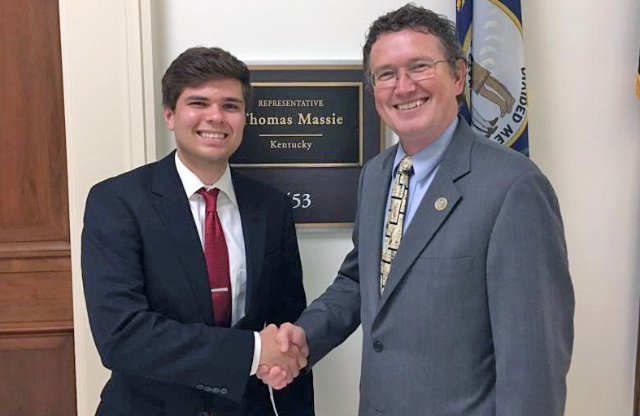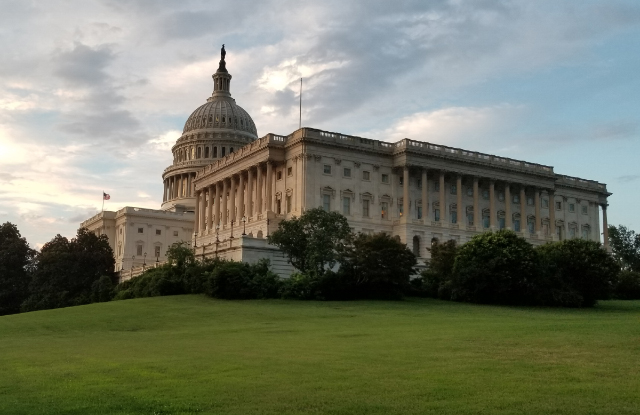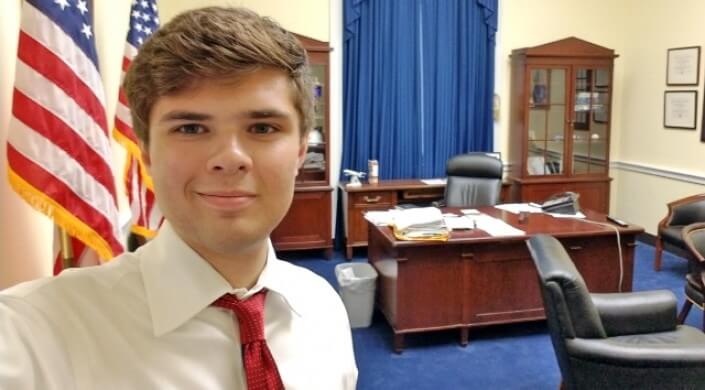News
During a summer internship, computer science concentrator Nicholas Boucher, A.B. '18, use his tech skills to help staffers in the office of U.S. Rep. Thomas Massie work more efficiently. (Photo provided by Nicholas Boucher.)
Nicholas Boucher had nearly finished mapping out his summer plans, choosing from among internship offers at several Silicon Valley tech giants.
As he neared a decision, so were voters across the U.S.
The presidential election was intensifying, and Boucher found himself captivated by the complexities of the political process. When the election culminated on Nov. 8, Boucher decided to withdraw his tech internship applications. Instead, he applied for Congressional office positions to learn more about the political system that had entranced the Harvard community and the rest of the nation.
“I ended up pulling a full 180,” said Boucher, A.B. ’19, a computer science concentrator at the John A. Paulson School of Engineering and Applied Sciences. “It was scary and intimidating, because I felt very comfortable in the tech world. This was very much venturing into new territory, but it made sense to me that it was the right time to try something new.”
Boucher accepted an internship in the office of Republican U.S. Rep. Thomas Massie, an electrical engineer and MIT graduate who represents Boucher’s hometown district in northern Kentucky. As he packed his bags for Washington, D.C., Boucher put preconceived notions and political ideologies aside, drawing motivation from the opportunity to improve the lives of constituents who may be friends and neighbors.

Boucher and U.S. Rep. Thomas Massie, who serves Boucher's hometown district in northern Kentucky. (Photo provided by Nicholas Boucher.)
His work took on the traditional trappings of a summer internship on The Hill—answering phones, corresponding with constituents by email, tracking legislation, and sifting through historical data of voter concerns.
“I learned right away that Washington, D.C. is a very fast-paced world,” he said. “On paper, roles are very clearly defined, but in practice, everyone is continually doing crisis management. Amid crisis after crisis, we all do what we need to do to keep the office afloat and keep the congressman doing his job.”
The important, yet mundane daily tasks were repeatedly shoved aside in the face of fresh catastrophes, which gave this technophile an idea.
Drawing on his computer science training, Boucher developed software that streamlined many routine activities. The software automatically generated summaries of topics constituents called the office to discuss, and reports on news stories that mentioned the congressman or relevant legislation, as well as the tone or theme of the coverage.
By automating what seem like simple tasks, Boucher’s software helped staffers reallocate several hours out of each workday.
“The software takes all this data and provides tools that can be used to draw insights from historical trends,” he said. “The goal of the program is to help the office prioritize the work they are doing based on what the data is actually saying about constituents, their concerns, and the factors that cause those concerns to vary over time.”
Boucher felt right at home building a software tool, and enjoyed taking ownership of a project. He acted as a one-man development team, embracing the challenge of designing software for individuals with little or no computational experience.
Working closely with staffers who have spent decades in the nation’s capital, and were more likely to have studied law or politics than engineering or computer science, was educational and rewarding, he said. He feels gratified that those individuals, constantly hard at work behind the scenes, continue to use his software.
“Politics aside, at the end of the day, I would rather see government officials with more time to spend on the priorities of their constituents and areas of reform where they want to drive change,” he said.
The internship impressed upon Boucher how technology can be applied to many different fields, and inspired him to consider incorporating computer science into other areas of interest.
“This experience helped me grow and appreciate viewpoints I didn’t appreciate before,” he said. “It gave me a much better idea of what the government process is really like—not the stuff you read in textbooks, but the way a government office operates every day. I’m still unsure of what I want to do in the future, but this definitely opened a door for me and inspired me to keep exploring.”

Cutting-edge science delivered direct to your inbox.
Join the Harvard SEAS mailing list.
Press Contact
Adam Zewe | 617-496-5878 | azewe@seas.harvard.edu
